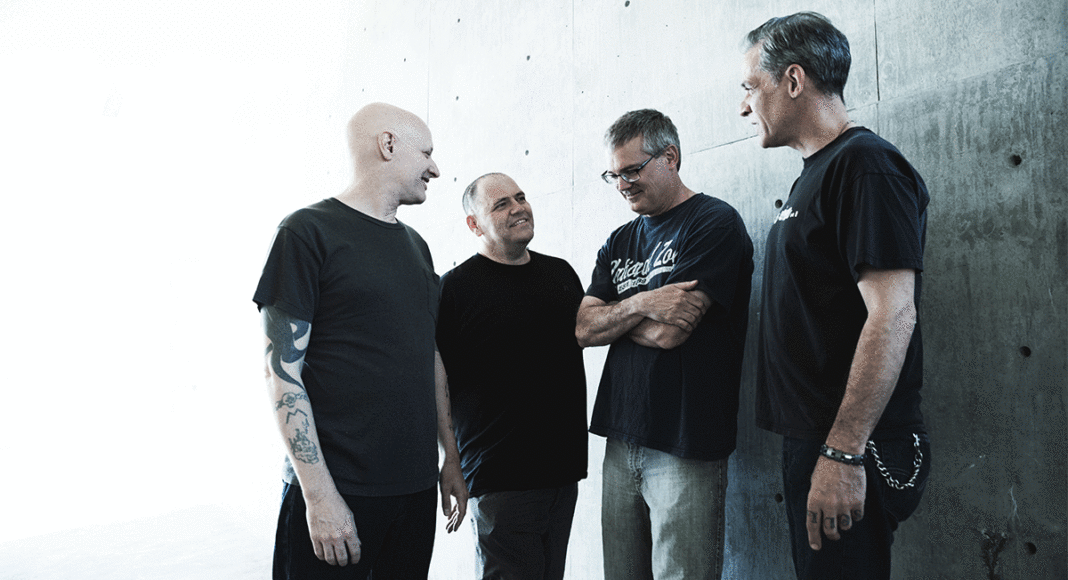With his biochemist alter ego and the spiky-haired, bespectacled caricature of his look that has become iconic after appearing on Descendents’ album covers for the last 35 years, Milo Aukerman is punk rock’s original nerd.
Still in his teens when he took over as lead singer for Descendents in the early ’80s, both Aukerman’s own style and the band’s melodic hardcore sound were instantly defined on 1982’s Milo Goes to College, their debut record. As Descendents rose from obscurity in the SoCal punk scene to be recognized as arguably the original pop-punk band, Aukerman’s geeky mystique also grew, especially after he left music to get his doctorate in biology, alternating for years afterward between punk rock and a career in biochemistry. Now, with Descendents touring and even releasing their first album in 12 years—2016’s Hypercaffium Spazzinate—Aukerman is proud to know he’s inspired a generation of punk nerdlings.
“Punks need to get educated, too,” he says by phone, with a laugh. “I always like to hear from people who say, ‘I went to college because of you.’ I’ve even heard from people who went all the way through grad school, got a Ph.D., and now they’re working at a university. That’s always very heartwarming to me. That’s the kind of schizophrenia of my personality; I have this equal passion for science and music.”
Certainly in 1982, no other punk band was writing songs like “Suburban Home,” a title the uninitiated might assume to be ripe with irony. It is not. Written by then-bassist Tony Lombardo, who was also a mailman, it featured lyrics like “I don’t want no hippie pad/I want a house just like mom and dad” that must have puzzled a hell of a lot of punks back then.
“We kind of took the punk sound and applied our own more nerdy perspective to it. Especially in ’81, ’82, that came across as completely against the grain,” says Aukerman. “It was like, ‘These guys don’t have tattoos, they don’t have Mohawks, and yet they’re playing this extremely fast, aggressive music.’ That’s been something we’ve been real proud to inject into punk—almost an anti-punk viewpoint.”
After all, the original view of punks, he says, was “more of a doofus, Sid Vicious kind of a deal. Nothing against Sid or whatever, but I just have a whole different life experience than that.”
By the mid-’90s, though, the sound Descendents had helped to pioneer (let’s not forget the Buzzcocks, although Pete Shelley and Howard Devoto might have punched you if you called them “pop-punk” in 1977) had broken through to the mainstream, with bands like Green Day and Blink-182 all over the radio. At the time, Aukerman had left the band, with the other members (led by drummer Bill Stevenson, who had been the architect of Descendents’ sound) soldiering on as All. Ingeniously, they picked this moment to come back together for 1996’s Everything Sucks, the first Descendents record in nearly a decade and the one that endeared them to the Warped Tour generation. The album will be re-released next month in celebration of its 20th anniversary.
“You think about what people define as ‘pop-punk,’ and then you look at what we did on Milo Goes to College and it’s like, ‘wow, that’s really more punk than pop. So when we started to write for Everything Sucks, it was like, ‘we gotta put the punk back into punk-pop.’”
Aukerman admits that was also the most stressful time in the band for him, simply because their sudden discovery by a legion of new fans meant they were burning themselves out trying to do 200 shows a year. He retreated to his science gig again, and the rest of the band went back to All. But after coming together again sporadically for years, he believes they’ve worked out a way to keep Descendents together for the long haul.
“Back then, we thought ‘let’s cram as many shows as we can into one year!’ Now we’re thinking ‘no, let’s see how many years we can do this.’ Because this is something that’s so valuable and so precious to us right now that we don’t want to mess it up by grinding ourselves into the ground,” he says.
It comes at a time when he’s starting to see his own view of the band shift, having finally given up his day job.
“It’s only as of the last year that I’ve considered music a career,” he says. “Prior to that, music was a hobby. And that gave me a unique perspective of ‘it’s a hobby, it’s supposed to be fun. ‘That’s been my mantra from the very start of all this. When it stopped being fun, I would leave. And then after a few years, I’d think ‘wait a minute, it wasn’t that bad! I should get back to this!”
Info: 9 p.m. on Thursday, April 6 and Friday, April 7 at the Catalyst, 1011 Pacific Ave., Santa Cruz. Tickets are $35.














